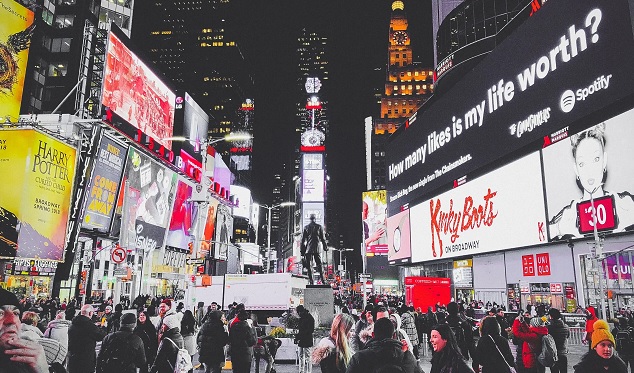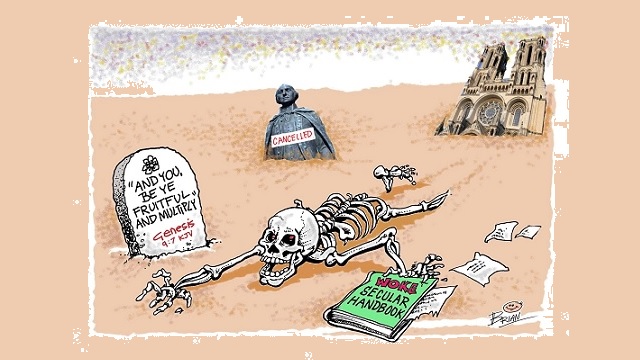Powers and Principalities: America Is at Spiritual War

The hour is late, and open war rages across the United States. No sword is drawn, no shot is fired, yet lives, souls, and civilization itself all hang in the balance. This present war is not a political one — though politics and government are the weapons used in this combat — but a spiritual one. Two religions are struggling for supremacy over America: leftism and Christianity.
“Marxism,” “communism,” “socialism,” “progressivism,” and even “relativism” and “atheism” are common buzzwords among conservatives, but each of these political and social ideologies is merely a contributor to the emergent religion of leftism. Yes, leftism is a religion, it is not simply an ideology: it mandates its own worship, its own doctrine, and even its own sacraments. It promulgates its tenets, enforced by malleable legislation, as positive goods — that is, ends which are good in and of themselves, not simply means to achieve ends which are determined externally to be good, as most political forces do. It was once the norm for varying political factions to agree, largely, on what would be good for the nation — whether that be the support of families, the growth of the economy, or the bolstering of the nation’s borders — predicated on the express will of the people, but to simply differ on how best to achieve those goods.
Not so in the 21st century. Leftism differs fundamentally from its foe on what those ultimate goods are for the nation; in fact, its devoutly, fervently held positions place it in direct opposition not to a political force but to a religion — namely, Christianity, by far the most prevalent religion in America. Abortion, transgenderism, homosexuality, pornography, open borders, and all the agenda items of leftism are directly and incontrovertibly contradictory to the moral standards of Christianity. Of course, conservatism has long advanced Christian moral standards in the public and political spheres, but the increasingly-common brand of secular conservatism uprooted from Christianity has proven toothless in the snarling face of leftism.
Nearly 70 years ago, the Catholic author and orator Archbishop Fulton J. Sheen predicted the rise of the religion of leftism, orchestrated by Satan himself. “He will set up a counter church which will be the ape of the Church, because he, the Devil, is the ape of God,” Sheen wrote. “It will have all the notes and characteristics of the Church, but in reverse and emptied of its divine content. It will be a mystical body of the Antichrist that will in all externals resemble the mystical body of Christ.” The archbishop prophesied that the religion of leftism “will be brotherhood of Man without the fatherhood of God…”
Indeed, the good bishop’s words seem unnervingly more than prescient. For nearly 2,000 years, Christians have celebrated the solemn feast of Easter, commemorating and glorifying Christ’s triumphant resurrection from the dead and victory over the grave. It cannot be mere coincidence that, this year, President Joe Biden declared Easter Sunday to be a national “Transgender Day of Visibility.” Consider that this is more than simply spitting in the face of devout Christians; it is the institution of a new and fatal religion’s highest holy day, intentionally coinciding with the date of Easter Sunday. Christians believe that, through the sacrament of baptism, we are born again, shedding the stain of original sin with which we were born in order to share in the glories of life eternal, opened to us by Christ’s resurrection. Traditionally, baptized Christians would even take a new name, an outward sign of their new identities in Christ. Transgenderism is leftism’s diabolically inverted answer to this sacrament: death to the old self, shedding the identity (sex) with which one was born, and taking a new name to go with one’s new identity.
Every doctrine that Christianity preaches, leftism preaches its own perversion of it. The love advocated by Christianity is rooted in absolute truth, in “Love Himself,” as C.S. Lewis once put it. Leftism advocates “love” unmoored, anchored by nothing more absolute than the weight of fickle feelings and emotions — though, when those emotions are felt, they do reign supreme.
Christianity upholds sacrifice as virtuous — the giving of oneself for the sake of love is the zenith of the virtue of charity. Christ Himself tells His followers, “Greater love hath no man than this, that a man lay down his life for his friends” (John 15:13). Leftism also values sacrifice, but never sacrifice of the self, only the sacrificing of others. Abortion is the ultimate example of this warped anti-virtue: sacrificing one’s own child for… financial comfort, a career, no responsibility, or even just consequence-free sex.
Christianity mandates submission to the will of God, accepting His design no matter how painful or difficult. Again, Christ Himself prayed, “O my Father, if it be possible, let this cup pass from me: nevertheless not as I will, but as thou wilt” (Matthew 26:39). Leftism demands obeisance to the only god it recognizes: the self-centered self. Transgenderism is demonstrative of this: just as Christian martyrs have willingly suffered torture for the sake of their faith, so the confused, self-centered, and self-loathing suffer mutilation and torture for the sake of their own wounded and twisted egos.
Like the dominant Christianity of the Middle Ages, leftism even has its own office of the inquisition. Those who do not toe the leftist line, who dare to question the new religion’s dogmas, are hounded out of the anti-church. The famed “Harry Potter” author J.K. Rowling is indicative of this. A multi-millionaire and self-declared feminist, Rowling was once a darling of leftist media and political activists. She supported the Labour Party in the U.K. and Barack Obama and Hillary Clinton in the U.S. Yet as soon as she voiced her concerns over transgenderism, she became a “heretic” to the church of leftism, targeted for disbarment from all the institutions controlled by leftism.
Although leftism is a uniquely 21st century phenomenon, its fundamental principles are nothing new. In fact, God has been dealing with the motivating mindset behind leftism since before the world began. The chief and unifying tenet of the leftist religion — indeed, that of all its precursors and predecessors, also — is naturalism. When first Lucifer said, in the words of the poet John Milton, “Better to reign in Hell than serve in Heaven,” naturalism was born. Naturalism is the belief, the assertion that the creature can replace the Creator, that the peasant may, if he slays the King, rule in His stead. It is the hubristic declaration that “God is dead, I am god.”
Satan was the first to declare thus, in his immense pride, galled by the humility of God’s plan to become a man, to take on the form of a mere creature — “these disgusting little human vermin,” as Lewis called them in the character of Screwtape, a hateful demon. He has declared it ever since, leading countless souls astray. In the Garden of Eden, that was the temptation offered by the Serpent: “You shall be as gods” (Genesis 3:5). Throughout Scripture and, certainly, throughout human history, that has been the great temptation, the great sin: to be as gods. When Moses ascended Mount Sinai, after God led the Hebrews out of slavery in Egypt, that temptation reared its head and the Hebrews made for themselves an idol (Exodus 32). Even then, the Hebrews fell to worshipping the demon Baal, until the prophet Elijiah proved the supremacy of God and slayed the Baalite priests (1 Kings 18).
Whether in the twilight years of the Roman Empire, throughout the Middle Ages, into the age of discovery, or even now in the modern day, men are tempted to declare themselves God, to worship their own selves over the crucified and resurrected person of Christ, to adhere to their own principles or preachings as supreme. Leftism is simply the culmination of this evil, this unbridled, unrestrained pride, brought to the fore via political prowess and instituted in American culture via institutions long ago captured by the prophets of leftism: Marxists, communists, perverts, abortionists, eugenicists, atheists, relativists, and countless other little ideologues subservient to the Luciferian sin of naturalism.
The current division in America is not ultimately a matter of Left versus Right, of Democrat versus Republican, of communist versus capitalist, but of good versus evil, of naturalism (in the form of leftism) versus Christianity, of the fallen angel Lucifer and his minions versus the crucified and resurrected Christ and the forces of Heaven. The war being waged over America at present is not a matter of differing political opinions but of diametrically opposed religions.
One side says that unborn babies, the most innocent of all persons, may be executed at will, torn apart and unceremoniously vacuumed out of the wombs of their mothers; that children may, on a whim, decide to ingest hormones foreign and unnatural to their bodies before subjecting themselves to irreversible surgeries so horrific that not even the most warped and depraved authors of the 19th and 20th centuries could have imagined them; that procreation is wholly unrelated to the conjugal act, that two men might sodomize one another and call it “love”; that sex-trafficking and child sexual exploitation are just the price to be paid for virtual images of increasingly perverted sex acts, readily available to young and old at the mere click of a button; that a nation has no sovereignty and must be subjected to millions of unvetted, unrestricted immigrants.
The other side says that innocence is worth preserving, that unborn children and their mothers must be cherished and protected from the evils of the abortion mill; that children must be raised to think and think critically, think well, think deeply; that the family is the basic and fundamental unit of society, that the very fabric of civilization would unravel without the family as its basis; that love necessitates self-sacrifice, not self-gratification; that nations have a God-given right to defend their borders and preserve the safety and security of their own people; that Christ is indeed King.
This present war is not between two ideological factions but between powers and principalities, between leftism and Christianity, between good and evil, between God and Satan. “Choose you this day whom ye will serve… As for me and my house, we will serve the Lord” (Joshua 24:15).
AUTHOR
S.A. McCarthy
S.A. McCarthy serves as a news writer at The Washington Stand.
RELATED ARTICLE: Pro-Israel Americans need to stop cowering and start protesting
EDITORS NOTE: This Washington Stand column is republished with permission. All rights reserved. ©2024 Family Research Council.
The Washington Stand is Family Research Council’s outlet for news and commentary from a biblical worldview. The Washington Stand is based in Washington, D.C. and is published by FRC, whose mission is to advance faith, family, and freedom in public policy and the culture from a biblical worldview. We invite you to stand with us by partnering with FRC.




